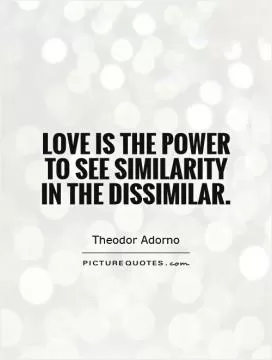There is no love that is not an echo

There is no love that is not an echo
The phrase "There is no love that is not an echo" holds a profound meaning when viewed through the lens of Theodor Adorno's philosophy. Adorno, a prominent German philosopher and sociologist, was known for his critical theory and analysis of modern society. He believed that love, like all human emotions and experiences, is shaped and influenced by the social and cultural context in which it exists.In Adorno's view, love is not a purely individual or personal experience, but rather a reflection of the larger societal structures and norms that shape our relationships and interactions with others. He argued that our understanding of love is mediated by the dominant ideologies and values of our time, and that our feelings and expressions of love are often influenced by external forces beyond our control.
Adorno believed that love is not a spontaneous or natural phenomenon, but rather a product of social conditioning and cultural influences. He saw love as a form of social behavior that is shaped by the norms and expectations of society, and that our experiences of love are often shaped by the images and representations of love that are presented to us through media, literature, and popular culture.












 Friendship Quotes
Friendship Quotes Love Quotes
Love Quotes Life Quotes
Life Quotes Funny Quotes
Funny Quotes Motivational Quotes
Motivational Quotes Inspirational Quotes
Inspirational Quotes